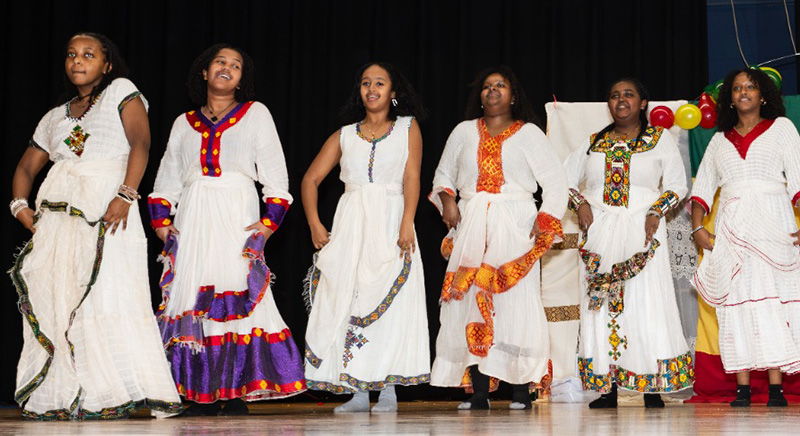Ethiopian community in Massachusetts celebrates the 128th Victory of Adwa

A dance during the 128th Adwa Victory Day Celebration held March 2 at the Morse School in Cambridgeport. (Photo: Massachusetts Ethiopian Support Association)
The sky in Cambridge was packed March 2 with dark clouds drizzling. Despite the rain, Ethiopians from Greater Boston came to the Morse Elementary School in Cambridgeport dressed in beautiful traditional attire, exchanging warm greetings in the school’s lobby or heading happily into the auditorium, eager to see what was going on inside.
Ethiopian flags and pictures of war heroes were displayed proudly, the ambiance brightening the gloomy day in Cambridge. After all, it was the celebration of the 128th Adwa Victory – a beacon of black people’s pride and history.
According to the African and Black Diaspora Journal, second-generation Africans are often given a black identity that is a legacy of specific African American histories, values and experiences – which are not shared by recent African immigrants.
For example, an Ethiopian mother who lives in a white suburb once said her daughter was told by her racist white classmate to “go pick cottons like your ancestors.”
In another incident, during a celebration of Black History Month, an Ethiopian girl who was the only black student in her second-grade classroom was reminded by her teacher that “if it was not for Martin Luther King, you would not have been here.”

Celebrations such as the 128th Adwa Victory Day held March 2 can delineate identity for the children of African immigrants. (Photo: Massachusetts Ethiopian Support Association)
Although African immigrants resonate with African Americans’ experiences in countless ways, the Massachusetts Ethiopian Support Association believes it is important to appreciate the values and the distinctive transnational identities of African immigrants.
“The question of identity can be tricky when raising kids as African immigrant parents in the U.S.,” said Genet Melesse, coordinator of the Enku Dance Studio. “I am more than delighted to be in a position to say that programs of Mesa, like the Adwa celebration, Enku Dankira and other community networkings, to name a few, are helping the second generation be confident, compassionate and proud of its heritage and history without undermining the fact that we all belong to one race which is, of course, the human race.”
Meklit Abel, a second-generation Ethiopian, had a lot on her plate at the event. She is a student at Enku, which was established by Mesa with a mission to connect Ethiopian kids to their roots, and led a group of kids assigned to chronicle the Victory of Adwa for the audience.
Behind the curtain, Abel and her team readied their costumes and their part to present on stage, then filled the stage with beaming smiles and acknowledged the war heroes and war horses of Adwa in broken Amharic. The audience responded with a round of applause and pride – although most of them did not pronounce the names right, it was evident that they had put a lot of effort into learning their history, and their desire to connect to their heritage and languages was clear.
The short dramatization of crucial moments of the Battle of Adwa started with a tense conversation in 1889 between Empress Tayitu (played by Rahel Fikre’ab) and the Italian agent Count Antonelli (played by Asnake Zewdu). In the drama, the empress refuses to be fooled by the Italian messenger into signing the infamous Wuchale Treaty, which had two versions – the Italian version giving Italy the right to make Ethiopia its protectorate. As a result, King Menilike declared war against Italy, asking his people to stand by him and warning his people about the consequences of not fighting: falling under the yoke of colonization. The drama ends with a scene of Ethiopians putting their heads up high after defeating the Italians. The drama was jeweled with Ethiopian folk songs and war dances unique to Ethiopians, showing ferocity and mock combat with an artistic touch to them.
“It was fun to be part of the show,” Abel said. “I and my friends have learned many cool things about our ancestors and the sacrifice they paid to preserve our freedom.”
The event also featured activities such as trivia questions, and an art competition. Renowned Ethiopian personalities such as author and ethnographer Fikeremarkos Desta, playwright Ayalneh Mulat and journalist Tesfaye Mamo attended the event virtually and in person, addressing the audience with uplifting messages centered on what Ethiopians can learn from Adwa to strengthen their unity in their diversity.
“African resistance against the yoke of colonization was propagated by the Victory of Adwa,’’ Desta said. Adwa played a vital role in igniting a black power movement in Caribbean countries, which makes it “the victory of all black people across the world who never stopped struggling for emancipation from oppression.”
In “The Wretched of the Earth,” the great black philosopher Frantz Fanon said, “Colonialism is not satisfied merely with holding a people in its grip and emptying the native’s brain of all form and content. By a kind of perverted logic, it turns to the past of oppressed people and distorts, disfigures and destroys it.”
Although Fanon said this six decades ago, and things have come a long way both in the global South and in the United States, moments such as Adwa had been and will continue to be the beacon of black people’s resistance and freedom.
As W.E.B. Du Bois puts it in his remarkable pageant, “The Star of Ethiopia”:
“Hear ye, hear ye! And remember forever and one day the Star of Ethiopia, All-Mother of Men, who gave the world the Iron Gift and Gift of Faith, the Pain of Humility and Sorrow Song of Pain, and Freedom, Eternal Freedom, underneath the Star.”



